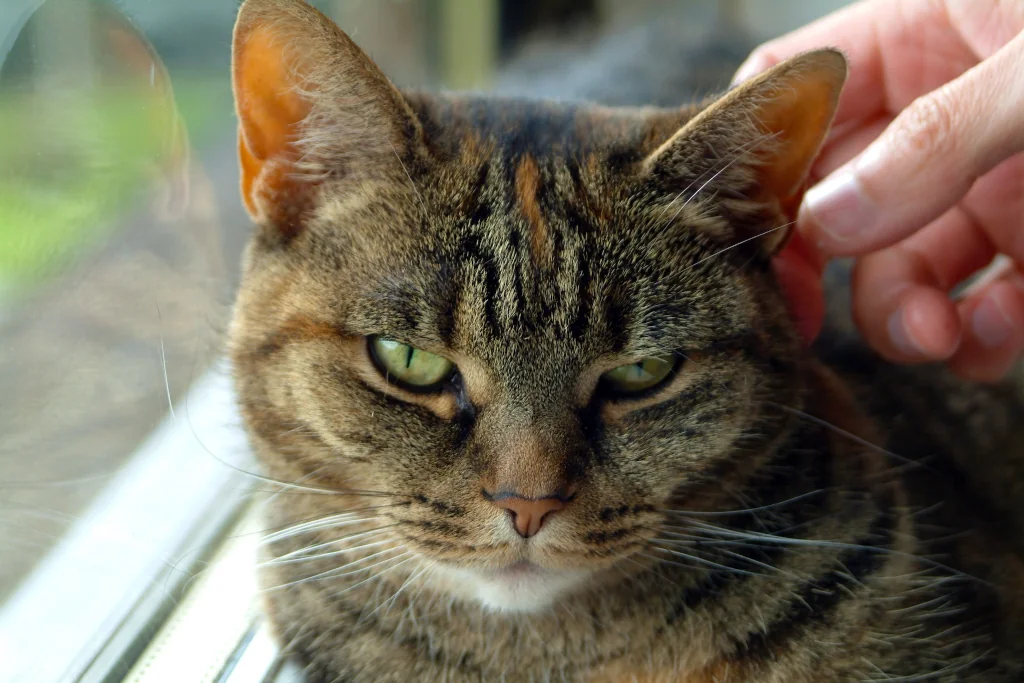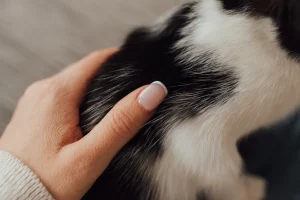Note: We may earn a commission from helpful, relevant links in our content. No cost to you. See our privacy policy.
Got a nose-pinching problem on your hands with your feline friend spraying around? If your cat is an unneutered male, you might be blaming his hormones for the pee-scented situation.
Keeping your cat’s world stink-free can seem like a tall order, but with a little understanding of your furry friend’s instincts, it’s completely possible.
By peeling back the layers on this instinctual behavior, we can find some solid strategies to keep your living spaces fresh and urine-free.

Why Do Cats Spray?
Cats spray, essentially, to communicate.
It’s a bit like feline Facebook; they’re leaving messages for other cats in their scent code.
More specifically, they’re marking their territory. Unneutered males, in particular, are prone to this behavior due to higher levels of testosterone.
The smell, as you may well know, is quite strong – that’s because it’s meant to grab attention, sending a clear signal that this space is already claimed.
Understanding this is key to tackling your cat’s spraying problem, and the first step to a fresher-smelling home!
The Connection Between Spraying and Neutering
Spraying is indeed strongly tied to a cat’s sexual maturity and their hormones.
As male cats reach sexual maturity, usually around six months of age, their testosterone levels spike. This hormonal surge triggers a range of behaviors, including spraying. You see, to a tomcat, spraying is a bit like a dating profile – it advertises his presence to potential mates and warns off rival males.
Neutering, or castration, is a surgical procedure that removes a male cat’s testes, reducing the hormone production that often drives spraying. It doesn’t guarantee an end to spraying, but it can significantly reduce the likelihood, especially when done before the cat starts the habit.
Neutering is usually recommended not just to curb spraying but also to prevent unwanted litters and reduce aggressive behaviors.
Of course, the decision to neuter should be discussed with your vet to ensure it’s the best choice for your feline companion’s health and well-being.
When Does Spraying Usually Begin in Male Cats?
The onset of spraying in male cats generally coincides with their sexual maturity.
Cats, like humans, go through puberty, although it hits our feline friends a bit earlier. Most male cats reach sexual maturity around six months of age, and this is often when spraying behavior kicks in.
However, remember every cat is unique. Just as some teenagers show signs of puberty sooner or later than their peers, so too with cats. Some male cats might start spraying a little earlier than six months, others a bit later.
You’ll want to keep an eye out for signs of sexual maturity in your feline friend – these can include more territorial behavior, more interest in the outdoors, and yes, spraying.
Practical Tips to Stop Your Cat from Spraying
So, how can you encourage your cat to stop turning your home into a smelly feline billboard? Here are some practical tips.
- Neuter Your Cat. As we mentioned before, neutering is often a successful way to reduce spraying. It lowers the testosterone levels that drive your cat’s urge to mark his territory.
- Clean Sprayed Areas Thoroughly. Use an enzyme-based cleaner specifically designed to break down pet urine. Regular household cleaners might not fully eliminate the scent, encouraging your cat to re-mark the area.
- Limit Outdoor Views and Sounds. It’s true that cats often enjoy window gazing, but in some cases, what they see or hear outside can cause stress or territorial behaviors. If your cat can see or hear other cats outside, it might trigger the instinct to mark territory. Use blinds, curtains, or even furniture to block their view.
- Provide Enough Resources. Make sure you have enough litter boxes (one per cat, plus one extra is a good rule of thumb), food and water bowls, and scratching posts, especially in multi-cat households. Competition over resources can lead to spraying.
- Use Feline Pheromone Products. Synthetic pheromone sprays or diffusers can help reduce stress and deter marking behaviors. These mimic the “friendly” markers cats leave when they rub their faces on things.
- Create a Calming Environment. Stress can trigger spraying, so ensure your home is a cat-friendly, peaceful haven. Avoid sudden changes in routine where possible, and introduce new pets or family members slowly and calmly.
- Consult a Cat Behaviorist. Sometimes, you need a professional to step in. If your cat’s spraying seems driven by stress or anxiety, a cat behaviorist can offer tailored solutions you might not have considered.
And now, for our unique tip:
- Teach Your Cat to “Do Its Business” on Command. This might sound surprising, but with patience, you can train your cat to urinate on command, much like you can teach a dog to sit or stay. Start by observing your cat’s bathroom habits to identify when they typically need to go. Then, use a verbal cue, like “Go pee,” when you notice these signs. Reward your cat when it urinates in the appropriate place in response to the cue. With consistency, this can become an ingrained habit, helping to control when and where your cat marks its territory!
What If My Male Cat Doesn’t Spray?
Having a male cat that doesn’t spray may seem like a blessing in disguise, and it often is! It could simply mean your cat doesn’t feel the need to mark his territory or assert dominance, and that’s perfectly okay.
But as a pet parent, it’s essential to understand that each cat is unique with their behavior and habits. If your male cat is not spraying, especially if he’s neutered, then it’s a sign of his contentment in his environment. He feels secure and doesn’t perceive any threats to his territory.
In my years of experience as a cat owner, I’ve observed that cats that are well-socialized from a young age and have established a secure bond with their humans often don’t resort to behaviors like spraying.
My tabby Smokey, for example, never showed any interest in spraying. He was neutered early, raised in a stress-free environment, and socialized well with other pets in the house. His behavior just goes to show that not all unneutered cats will spray.
However, this doesn’t mean you should let your guard down. Keep observing your cat’s behavior and health. If he’s not neutered, consider the benefits of the procedure for both his health and behavior.
And if you notice any sudden changes in his urination patterns or volume, don’t ignore it – it could be a sign of health issues that require immediate veterinary attention.
FAQs
Will neutering stop my adult cat from spraying?
Neutering often significantly reduces or even eliminates spraying in adult cats. However, it’s more effective when done before the cat starts spraying.
Does a cat’s diet influence their spraying behavior?
A cat’s diet does not directly influence their spraying behavior. However, a healthy diet contributes to overall well-being, which may indirectly reduce stress-related behaviors like spraying.
What if my neutered cat is still spraying?
If your neutered cat is still spraying, it could be due to stress, medical issues, or environmental factors. A consultation with a veterinarian or a cat behaviorist can help identify the cause and suggest solutions.
Does spraying mean my cat is unhappy or stressed?
While spraying can be a sign of stress or unhappiness in a cat, it’s also a normal behavior associated with marking territory, especially in unneutered males. If a neutered cat sprays, it’s more likely due to stress or unhappiness.
Alex, a passionate animal lover, has experience in training and understanding animal behavior. As a proud pet parent to two dogs and three cats, he founded AnimalReport.net to share insights from animal experts and expand his knowledge of the animal kingdom.









